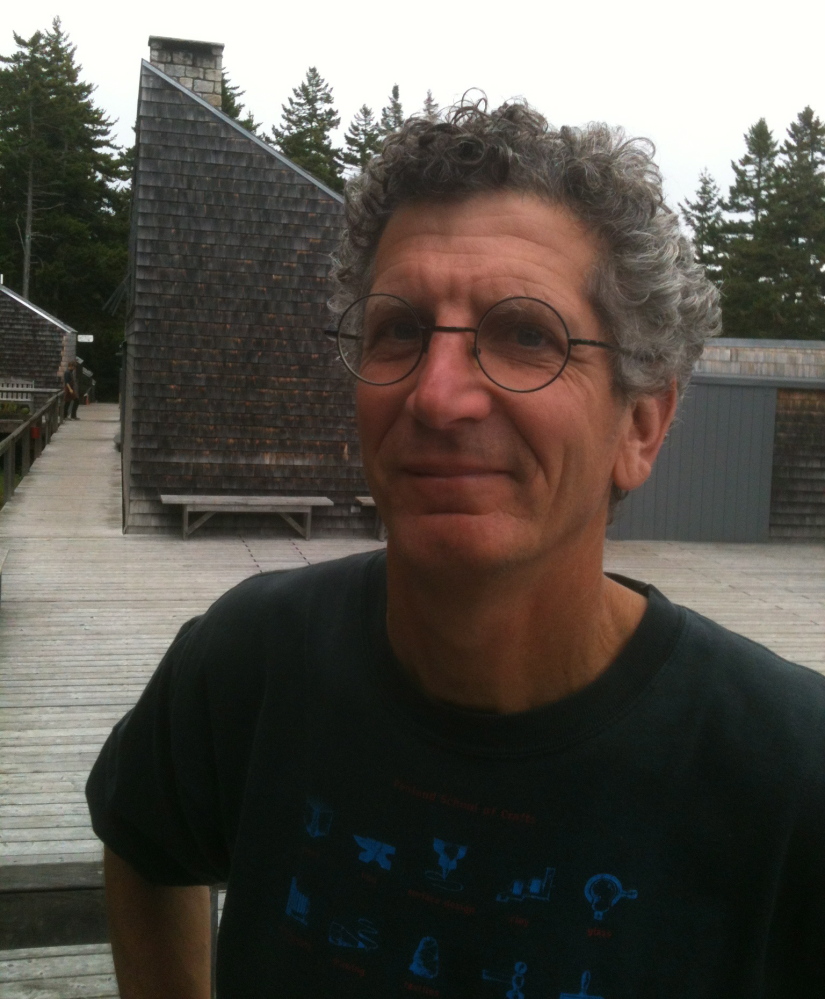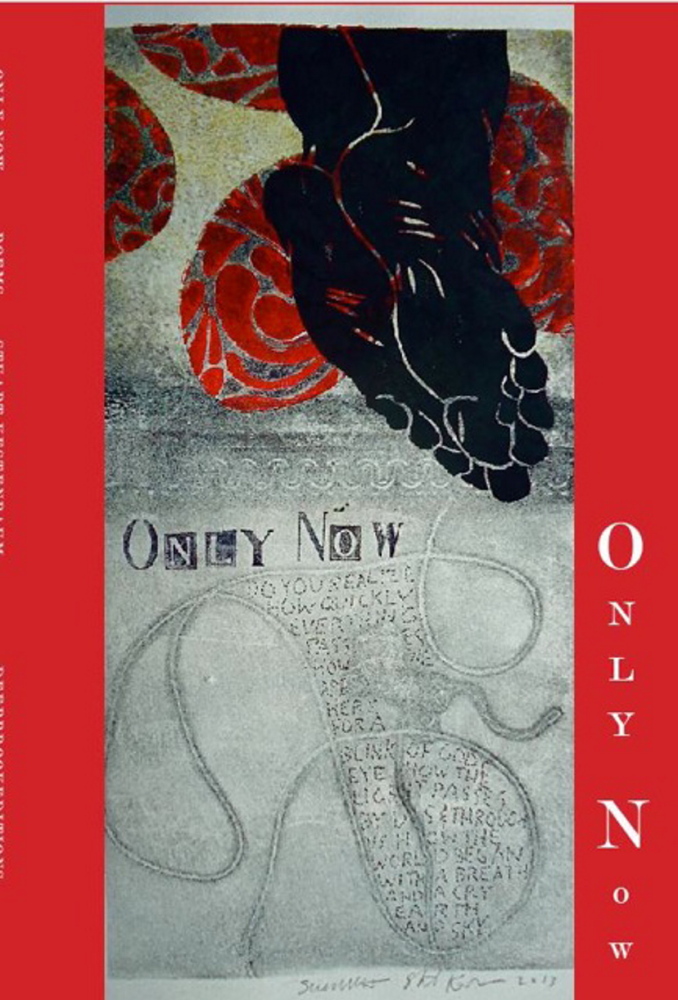For his latest volume of poetry, Maine writer Stuart Kestenbaum collaborated with his artist-wife, Susan Webster, on the cover. She made a print, and Kestenbaum filled the space she left for him with words.
The constraint of that space meant that his title poem, “Only Now,” had to be concise. The poem creates nostalgia in fleeting two- and three-word lines.
“Only Now,” published by Deerbrook Editions of Cumberland, is Kestenbaum’s fourth book of poetry and often touches a theme of time, passage and the fragility of the world, large and small. His poems and writing have appeared in numerous publications and magazines, and Garrison Keillor has read his work on “The Writer’s Almanac.”
When not writing, Kestenbaum directs Haystack Mountain School of Crafts in Deer Isle, a position he has held for 25 years.
We spoke by phone last week, on the first day of the working season at Haystack. The maintenance staff was taking stock of the winter and preparing for the season ahead. It was like opening day in baseball: Full of optimism and hope. There were still mounds of ice in the parking lot, but the day’s activity imagined a campus full of creative people, making, talking and laughing.
“You think it’s never going to happen, then you cannot imagine it never was happening,” Kestenbaum said.
Q: You cover a lot of turf in these poems, but I sense a larger arc of personal quest here. I suppose that’s the nature of poetry, but this volume seems to represent something more or bigger for you. Is that accurate?
A: I think I’m aware of time and am at a place where I can see time as passed and time ahead for me. Time is always a factor, but it seems more pressing now. I am at a place where I can look at earlier memories. Memories change the longer you live with them.
Maybe it’s a longer arc. When I asked (friend and poet) Stephen Dunn to read the manuscript and comment on it, he said they were like elegies in advance. I think he’s right. There is an optimism in there, but there is a sense of mortality.
Q: What do you worry about the most?
A: Besides baseball? I probably worry about small things but not big things. Really small things like baseball. But the biggest things, I am more surrounded by it or within it, but not worrying about. I can worry about lots of little things, but the thing to realize is they don’t add up to one big thing.
Q: When do you write?
A: I am endeavoring to write in the morning. That is when I am the most fluid. I have a room to write in at home, and usually it will be 6:30 or 7 o’clock. Lately, I am trying not to listen to the radio before I write, or look at the newspaper. Nothing in my head except where I want to go.
Q: How long have you been writing poetry, and what led you to it?
A: Probably since high school. I think the way it can succinctly express deep emotions and in a way that can be very unexpected. There is a distance. If the poem is working well you can travel very far in a few lines. Other art forms can do other things, but I don’t think they can travel that far that compactly.
Q: Why is Maine such a conducive place for writers?
A: I think there is a – there are so many different kinds of communities in Maine. The community you live in, the community of writers that you know. There is a solidarity that way. A community of artists. It’s an amazing place to be. The sense of place is really important. That has an impact on people, even if they do not write about place. Maine is a place you can feel grounded.
Q: What do you love about living on Deer Isle?
A: I like to go places, but it’s just a great place to be. There is a sense of community yet no overbearing sense. You can be who you want to be, and not be what’s expected. Most people are willing to grant that latitude to people. You can be the way you want to be within the community. And it’s an incredibly beautiful place to be. I like to go places and come back.
Q: You just came off a sabbatical. I have two questions about that – three actually. One, what did you do on your sabbatical? Two, why are sabbaticals important? And three, how do I get one?
A: We went to Portland, Ore., for a small residency program where Susan and I could work, and made some prints together. We came back here and shoveled snow. Then we went to New Mexico and mostly drove around and looked at the geology. It’s amazing to see that landscape.
We went to Paris for two weeks. I hadn’t been there since I was in college. Very different places. I really wanted to be home, too. We wanted to be rooted at home, too. I really like the seasons. I didn’t want to miss the whole winter.
I hadn’t really taken a break like that since I started. It gave me time. I had a lot of the poems in the manuscript. It was done, but I hadn’t really sat with it. I pulled some poems out and added other ones. I wasn’t rushed.
Sabbaticals are important because they allow you to shut off one part of your brain, especially if you have a job where you are thinking about things all the time. You will always benefit the place you go back to. You are charged up with new ideas.
As for how you can get one, I’ll write a letter for you. I’ll tell them to give you one.
Staff Writer Bob Keyes can be contacted at 791-6457 or:bkeyes@pressherald.combkeyes@pressherald.comTwitter: pphbkeyespphbkeyes
Send questions/comments to the editors.





Success. Please wait for the page to reload. If the page does not reload within 5 seconds, please refresh the page.
Enter your email and password to access comments.
Hi, to comment on stories you must . This profile is in addition to your subscription and website login.
Already have a commenting profile? .
Invalid username/password.
Please check your email to confirm and complete your registration.
Only subscribers are eligible to post comments. Please subscribe or login first for digital access. Here’s why.
Use the form below to reset your password. When you've submitted your account email, we will send an email with a reset code.